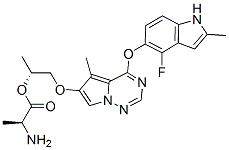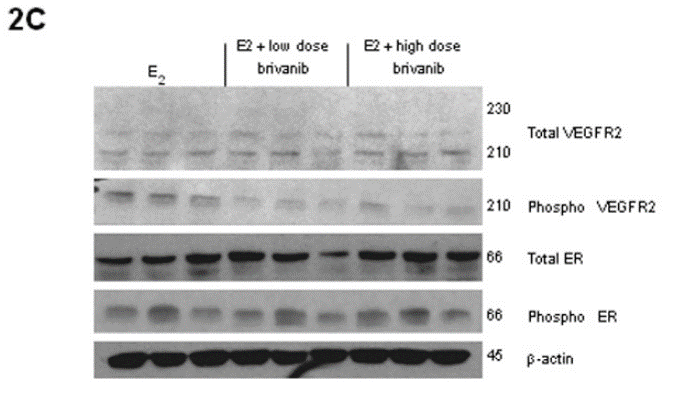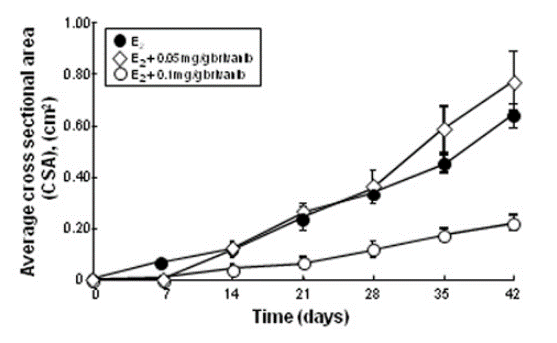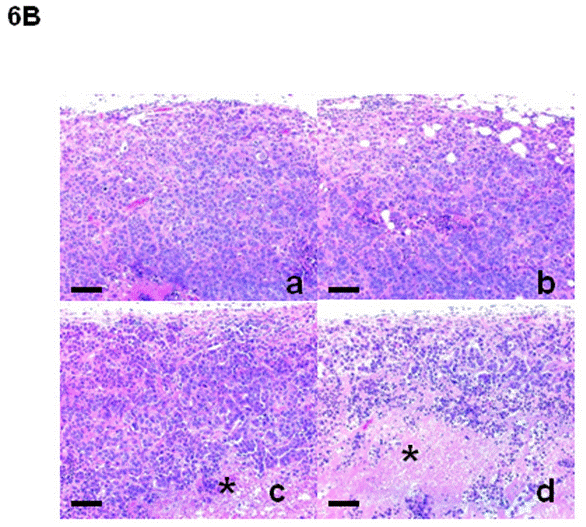research use only
Brivanib Alaninate (BMS-582664) VEGFR inhibitor
Cat.No.S1138

Chemical Structure
Molecular Weight: 441.46
Quality Control
| Related Targets | EGFR PDGFR FGFR c-Met Src MEK CSF-1R FLT3 HER2 c-Kit |
|---|---|
| Other VEGFR Inhibitors | SAR131675 SU 5402 Cediranib (AZD2171) Vatalanib (PTK787) 2HCl Anlotinib (AL3818) Dihydrochloride Linifanib (ABT-869) Apatinib (YN968D1) Apatinib (YN968D1) mesylate Semaxanib (SU5416) Ki8751 |
Solubility
|
In vitro |
DMSO
: 88 mg/mL
(199.33 mM)
Ethanol : 88 mg/mL Water : Insoluble |
Molarity Calculator
|
In vivo |
|||||
In vivo Formulation Calculator (Clear solution)
Step 1: Enter information below (Recommended: An additional animal making an allowance for loss during the experiment)
Step 2: Enter the in vivo formulation (This is only the calculator, not formulation. Please contact us first if there is no in vivo formulation at the solubility Section.)
Calculation results:
Working concentration: mg/ml;
Method for preparing DMSO master liquid: mg drug pre-dissolved in μL DMSO ( Master liquid concentration mg/mL, Please contact us first if the concentration exceeds the DMSO solubility of the batch of drug. )
Method for preparing in vivo formulation: Take μL DMSO master liquid, next addμL PEG300, mix and clarify, next addμL Tween 80, mix and clarify, next add μL ddH2O, mix and clarify.
Method for preparing in vivo formulation: Take μL DMSO master liquid, next add μL Corn oil, mix and clarify.
Note: 1. Please make sure the liquid is clear before adding the next solvent.
2. Be sure to add the solvent(s) in order. You must ensure that the solution obtained, in the previous addition, is a clear solution before proceeding to add the next solvent. Physical methods such
as vortex, ultrasound or hot water bath can be used to aid dissolving.
Chemical Information, Storage & Stability
| Molecular Weight | 441.46 | Formula | C22H24FN5O4 |
Storage (From the date of receipt) | |
|---|---|---|---|---|---|
| CAS No. | 649735-63-7 | Download SDF | Storage of Stock Solutions |
|
|
| Synonyms | N/A | Smiles | CC1=CC2=C(N1)C=CC(=C2F)OC3=NC=NN4C3=C(C(=C4)OCC(C)OC(=O)C(C)N)C | ||
Mechanism of Action
| Features |
Alanine prodrug of BMS-540215.
|
|---|---|
| Targets/IC50/Ki |
VEGFR2
25 nM
Flk1
89 nM
FGFR1
148 nM
VEGFR1
380 nM
|
| In vitro |
Brivanib Alaninate (BMS-582664) inhibits VEGF-stimulated and FGF-stimulated proliferating of HUVECs with IC50 of 40 nM and 276 nM. This compound (2 μM) significantly inhibits VEGFR2, FGFR1, ERK1/2 and Akt phosphorylation in VEGF- and bFGF-stimulated SK-HEP1 cells and HepG-2 cells, while it alone has little effect on levels of phosphorylated ERK1/2, Akt, VEGFR2, and FGFR1 in nonstimulated cells. It inhibits CYP2C19, CYP3A4(BFC) and CYP3A4 (BzRes) with IC50 of 2.4 μM, 0.51 μM and 1.6 μM, respectively. Additionally, it exhibits high solid state stability (only 0.3% degradation at 50℃ with desiccant over a period of 12 weeks) and acceptable solution state stability up to pH 6.5.
|
| Kinase Assay |
Kinase inhibition assays
|
|
For the VEGFR2, Flk1 and FGFR1 kinase assays, Brivanib Alaninate (BMS-582664) is dissolved in DMSO and diluted with water/10% DMSO to a final DMSO concentration of 2%. The kinase reactions consists of 8 ng of enzymes with GST tag, 75 μg/mL substrate, 1 μM ATP, and 0.04 μCi [γ-33P]ATP in 50 μL total reaction volume (kinase buffer: 20 mM Tris, pH 7.0, 25 μg/mL BSA, 1.5 mM MnCl2, 0.5 mM dithiothreitol). In all cases, the reactions are incubated for 60 min at 27℃ and terminated with the addition of cold trichloroacetic acid (TCA) to a final concentration of 15%. The percent inhibition from the kinase assays is determined by nonlinear regression analyses, and data are reported as the inhibitory concentration required to achieve 50% inhibition relative to control reactions (IC50).
|
|
| In vivo |
Brivanib Alaninate (BMS-582664) (50 mg/kg) results in AUC of 136 μM×hr and Cmax of 41 μM in mouse. This compound (60 mg/kg, orally) is rapidly absorbed with Tmax of 1 hour, a favorable half-life (t1/2) of 2.7 hours and mean residence time (MRT) of 3.6 hours in mouse. It (25 mg/kg) results in AUC of 13.4 μM×hr and Cmax of 6.4 μM in rat. BMS-582664 dose-dependently inhibits the growth of established tumors with tumor growth inhibition of 85% and 97% at dose of 60 mg/kg and 90 mg/kg in H3396 xenografts athymic mice. It inhibits the growth rate of tumors in mice with patient-derived xenograft line 06-0606 by 55% and 13% at dose of 50 mg/kg and 100 mg/kg. This compound (60 mg/kg, orally) significantly reduces tumor weight at sacrifice, increases apoptosis, reduces microvessel density, inhibits of cell proliferation, and down-regulates cell cycle regulators in mice with patient-derived xenograft line 06-0606. It dose-dependently inhibits the growth of established tumors with tumor growth inhibition of 85% and 97% at dose of 80 mg/kg and 107 mg/kg in a L2987 nonsmall cell lung tumor xenografts assay in athymic mice. BMS-582664 (100 mg/kg) significantly modulates tyrosine kinase receptor 1 (Tie-1), collagen type IV alpha1 (Col4a1), complement component 1, q subcomponent receptor 1 (C1qr1), angiotensin receptor-like 1 (Agtrl1), and vascular endothelial-cadherin (Cdh5) in L2987 nonsmall cell lung tumor xenografts assay in athymic mice. It (100 mg/kg) inhibits the new growth of endothelial cells in two xenografts mouse models, L2987 and HCT116.
|
References |
|
Applications
| Methods | Biomarkers | Images | PMID |
|---|---|---|---|
| Western blot | VEGFR2 / p-VEGFR2 / ER / p-ER / β-Actin |

|
20303261 |
| Growth inhibition assay | MCF-7 E2 tumors |

|
20303261 |
| IHC | H&E staining in necrotic tissue |

|
20303261 |
Clinical Trial Information
(data from https://clinicaltrials.gov, updated on 2024-05-22)
| NCT Number | Recruitment | Conditions | Sponsor/Collaborators | Start Date | Phases |
|---|---|---|---|---|---|
| NCT00390936 | Completed | Solid Tumors |
Bristol-Myers Squibb |
October 2007 | Phase 1 |
| NCT00435669 | Completed | Tumors |
Bristol-Myers Squibb |
September 2007 | Phase 1 |
| NCT00437424 | Completed | Carcinoma Hepatocellular |
Bristol-Myers Squibb |
July 2007 | Phase 1 |
| NCT00437437 | Completed | Tumors |
Bristol-Myers Squibb |
May 2000 | Phase 1 |
Tech Support
Tel: +1-832-582-8158 Ext:3
If you have any other enquiries, please leave a message.






































